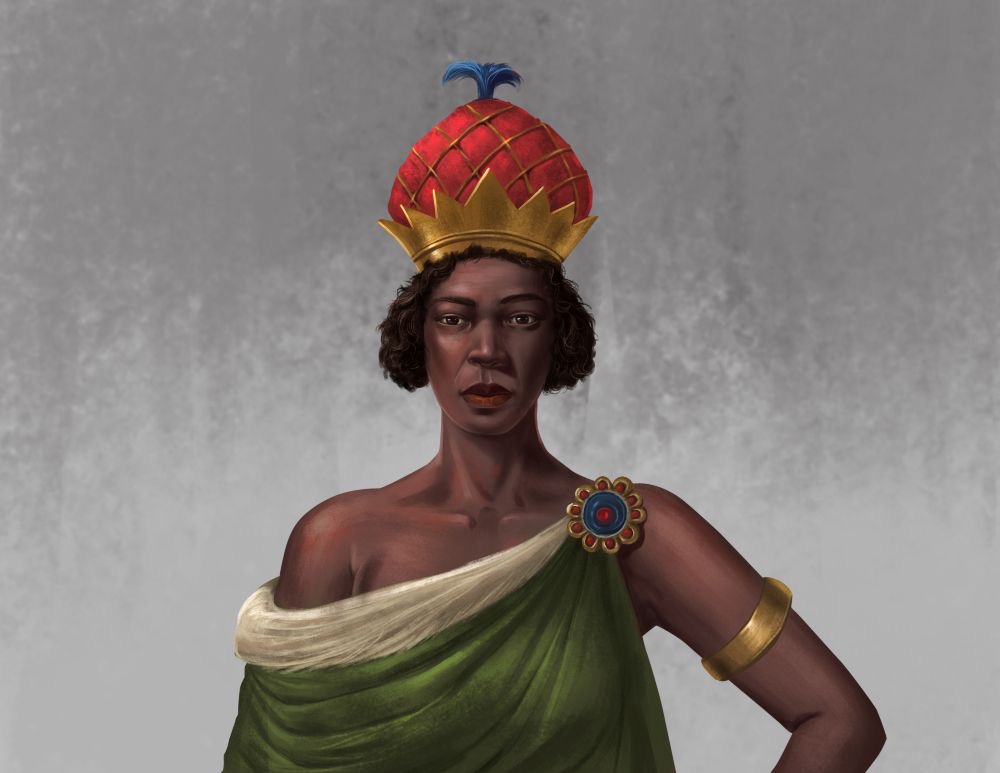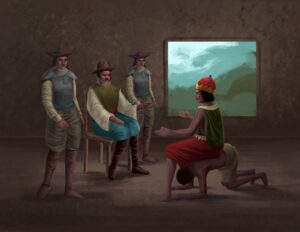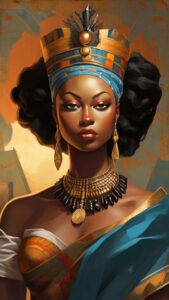Queen Nzinga : The Warrior Queen of Angola
In the heart of Central Africa, in what is now Angola, a girl was born into royalty in 1583. Her name was Nzinga Mbande, and she would grow to become one of the most iconic African leaders in history—a woman whose courage, intelligence, and strategic brilliance defied colonial powers and inspired generations to come.
Nzinga was born into the royal family of the Ndongo Kingdom, part of the Mbundu people. Her father, Ngola Kiluanji Kia Samba, was a wise and strong ruler. From an early age, Nzinga showed remarkable intelligence and a fierce spirit. Unlike many girls of her time, she was allowed to sit in on political meetings and military briefings, learning the art of diplomacy and war.
Her name, Nzinga, is said to come from the Kimbundu verb “kujinga,” meaning “to twist or turn”—reflecting the umbilical cord wrapped around her neck at birth, a sign among her people that she was destined for greatness.

By the early 1600s, the Portuguese had begun expanding their colonial ambitions into the interior of Africa, driven by the lucrative slave trade. The Kingdom of Ndongo was under immense pressure—Portuguese forces raided villages, enslaving the Mbundu people and destabilizing the kingdom.
After the death of her brother, King Mbande, Nzinga assumed power in 1624—though not without struggle. Many questioned a woman’s ability to rule, but Nzinga would silence all doubts with her leadership.

One of the most iconic moments of her life came in 1622, when she was sent as an envoy to negotiate peace with the Portuguese governor in Luanda. The Portuguese offered chairs to themselves but only a mat to Nzinga—symbolizing her lower status. Nzinga refused to accept this insult. Instead, she commanded one of her aides to get down on hands and knees, using his back as a human stool. She sat tall, eye-to-eye with the governor, demanding equal treatment.
This act was more than symbolism; it was a statement: Nzinga would not bow to foreign powers.
Warrior Queen
After diplomacy failed and the Portuguese continued their aggression, Nzinga transformed from diplomat to warrior. She fled west and re-established her kingdom in Matamba, a neighboring territory. There, she built a powerful army, often consisting of formerly enslaved people, women warriors, and displaced Africans who found refuge in her realm.
Nzinga personally led troops into battle, donned in armor, astride a horse, commanding loyalty and respect. She forged alliances with the Dutch, enemies of the Portuguese, and used guerrilla warfare tactics that confounded European forces for decades.
For nearly 40 years, she resisted colonization, refusing to surrender her people to slavery or submission. Nzinga proved that resistance was not futile—it was necessary.
Legacy of a Legend
Nzinga died in 1663 at the age of 80. Though her kingdom eventually fell to colonial rule, her legacy endured far beyond her lifetime.
In modern Angola, Nzinga is a national hero. Streets, schools, and monuments bear her name. Her story is taught in schools, not just as a tale of resistance, but as a symbol of African pride, female strength, and unyielding dignity. Her legacy reaches beyond Africa, resonating with oppressed peoples around the world.
Nzinga’s life challenges the narrative that colonized peoples were passive victims. She showed that African women could be as politically astute, as strategically brilliant, and as fiercely courageous as any ruler in history.
Why Nzinga Inspires Today
In a world still grappling with inequality, colonial legacy, and gender bias, Nzinga stands as a beacon of resistance and empowerment. Her refusal to accept subjugation, her brilliant tactics, and her pride in her people’s sovereignty continue to inspire activists, feminists, and leaders across the globe.
Her story reminds us that the struggle for justice and freedom is long, but it is never in vain.
